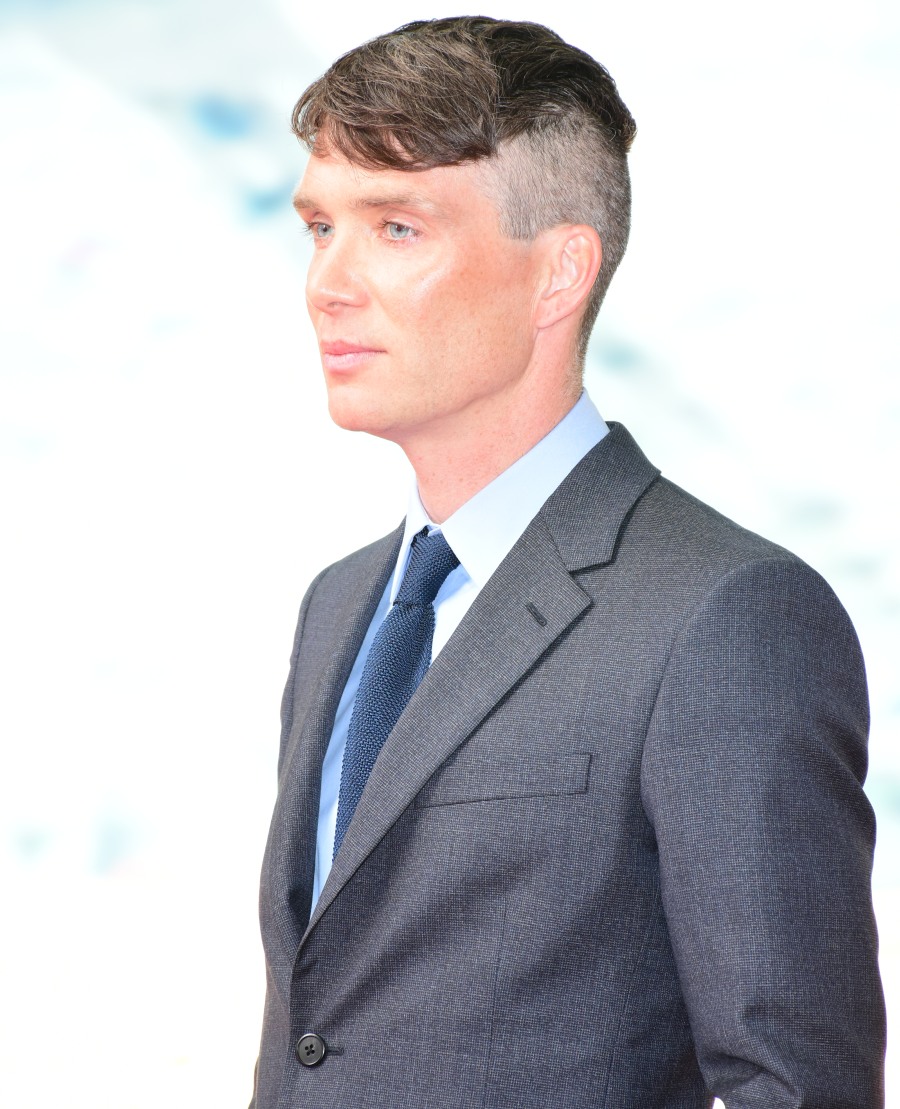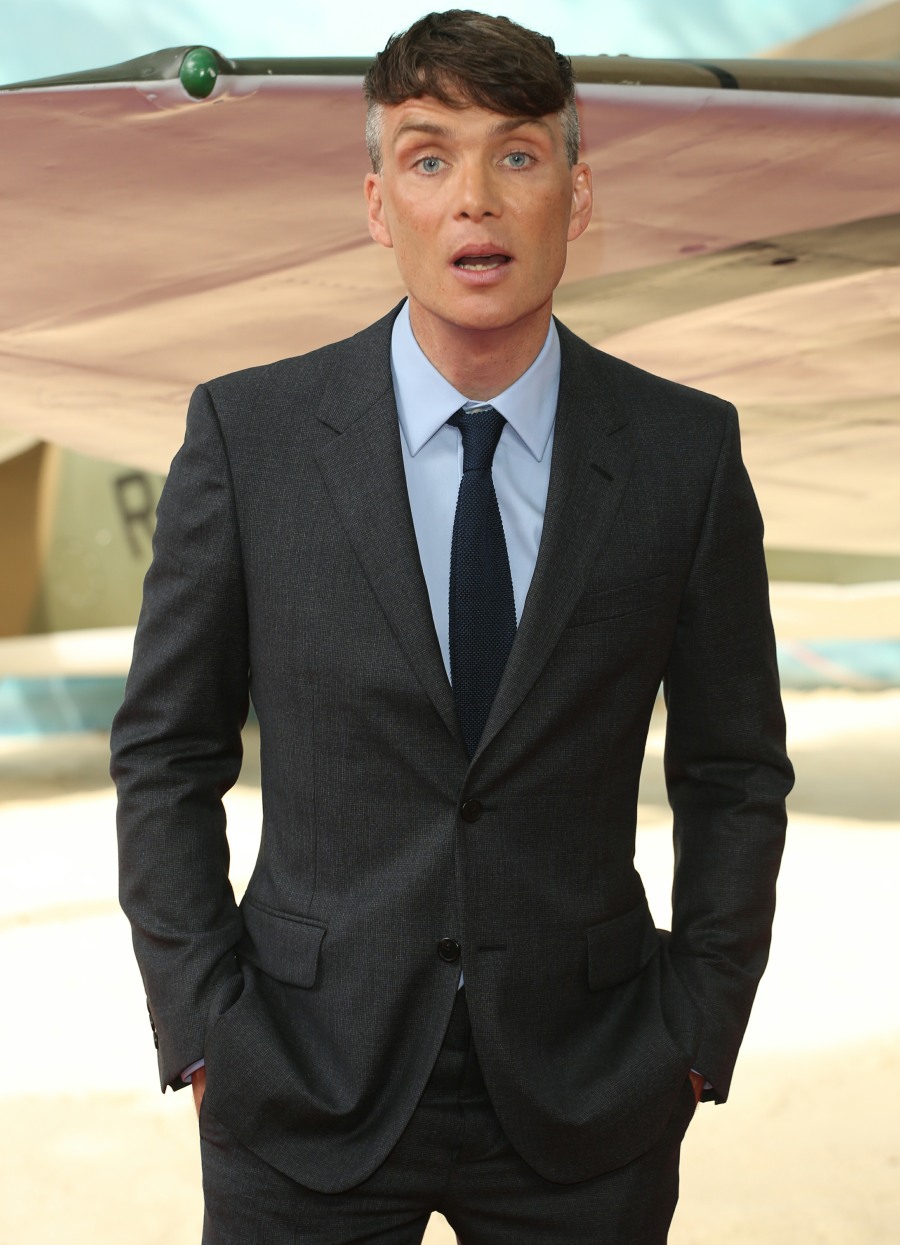You guys were right, I totally forgot about Cillian Murphy at the Dunkirk premiere last Thursday. I was just focused on Tom Hardy and the Harrys. I didn’t purposefully ignore Cillian’s strange, alien beauty, he just slipped my mind. Now that I’m looking at the photos though, I’m not that sorry. His hair is struggling, although that haircut is for his role on Peaky Blinders, apparently. It makes him look even more strange/delicate/alien-beautiful. Anyway, Cillian plays an unnamed, shellshocked soldier who is rescued by a civilian boat, captained by Mark Rylance’s character. Rylance’s character is on his way to rescue more British soldiers at Dunkirk and apparently Cillian’s role is pretty significant. This is the fifth time he’s worked with director Christopher Nolan and that’s a collaboration I can get behind (I remain unconvinced about Marty Scorsese and Leo D). Anyway, Cillian recently chatted about his character and Dunkirk and everything else. You can read the full piece here. Some highlights:
How he got the role: “Chris gave me a call and told me there was something he’d be sending me. We know each other well enough that he knows what might interest me, and what kinds of roles I might respond to and see as a challenge. And when it’s a Christopher Nolan film, chances are it’s going to be bloody good. It’s a lovely feeling when he does call you up again. And this one… I was just knocked out by it.
Dunkirk is not an American war movie: “What first struck me about Dunkirk was that it wasn’t an American war movie, which so many of the great movies about war have been. If you were making a list of great modern war movies, I can’t think of a British film over the last 30 or 40 years that you would necessarily place on it. So, I think this appealed to Chris as a filmmaker because he recognised something in this story that was hugely unique and that audiences wouldn’t necessarily have seen before.
What he knew about the real history of Dunkirk before this film: “I’m Irish, and we were a neutral country during World War II, so my understanding was quite limited until I learned more about it through research. It truly was an incredible moment in World War II, and in British history as a whole. It was the result of a wartime offensive that went terribly wrong, leaving hundreds of thousands of soldiers stranded on the coast of France. But it was redeemed by the will and determination of the people to bring these boys home. That’s the ‘Miracle at Dunkirk.’ The scope of this immense evacuation, under extreme duress and despite impossible odds, speaks to both the unity of a nation and the sacrifice and heroism of the individual soldiers and civilians who came together and, ultimately, were able to snatch victory from the jaws of defeat.
As a history buff – specifically, WWII-history buff – it is surprising that no one before now has made a major film about Dunkirk, because it was such an incredible and devastating moment of the war before the Americans got involved. But I think that’s what Cillian is referencing – most of the stories about WWII are told through an American perspective, like the war just started in 1941 when Pearl Harbor was bombed. The Battle of Britain was harrowing, and what the Nazis did in Northern Africa in the late 1930s is still largely left untold. Europe was dealing with Nazi bulls–t for years prior to American involvement. Those stories should be told too.
Photos courtesy of Joe Alvarez/WENN and WENN.



















When I look at his face, all I see is Emmanuelle Seigner
Carol- bang on. Can’t unsee.
The little ships bit of it is quite an amazing story. There’s a boat on display at the Imperial War Museum that took part in the evacuation and it’s about ten feet long!
My great uncle was a merchant seaman during WWII, on the Atlantic Convoys, and although he had nothing to do with the Dunkirk evacuation, he had dozens of stories from other merchant seamen who had.
My grandmother used to tell it to us little kids like it was the greatest fairy tale ever but it was real and a truly astounding feat.
And I’m rejoicing that we have now had three straight days of Alien Beauty.
It really was. I feel lucky that I was born early enough to get the stories from relatives who actually lived that war. Dunkirk *was* a feat. They requisitioned all sorts of craft to take part and they were picking up men who had literally been standing shoulder deep in tidal water for endless hours. It really was that dramatic. I can imagine it will make a fabulous film.
Me too!
How was WW2 in Britain for civillians? I know things were hard beacuse of air raids and lack of food, but was it the same as in continental Europe?
When my grandma used to tell stories about WW2 she told us about all the armies going trough villages, steling, killing, raping… something like that wasn’t going on in Britain, was it? So how is the perception of WW2 there?
Aside from the bombing raids, my older aunts and uncles told it as just an unending grind in terms of having next-to-nothing materially. I mean, even things like park railings had all been taken down, requisitioned for the war effort. On the other hand, it was in a way a time of freedom for children who hadn’t been evacuated to the countryside as the mothers were all in factories and whathaveyou and they were often unsupervised.
Both sides of my family had two distinct sets of children – the ones born before the war and the ones born after the war!
@kata. My mum was evacuated during the war, but was there for some of it. As we were not invaded, our story is completely different, in a child’s eye it was patchy, with memories of camaraderie, kindness, tension, fear and horror. My mum saw little friends bombed and killed. Bodies in buildings, air raids and rationing. She lived in the east end of London. My nan didn’t speak much of the war, we thankfully didn’t loose many family, but many friends. This war was the most catastrophic of its time. Us brits came off badly, but not more so than Russia, Poland, China, India and others.(talking civilian casualties ).
My mother and father were children in England during WWII. I do remember the bomb shelter that was still in my nana’s house (under the stairs), and mom and dad telling me about being evacuated to the country. And black out curtains, the noise of bombs and anti aircraft guns and incendiary bombs taking out a house down the street from my nana’s. My mom’s dad had a shop and she talks about rationing and how one stick of butter had to last a week for a family; things like that. Rationing didn’t end until a few years after the war did either.
@kata – My Aunt (inlaw)was evacuated to Manchester from East End London but was there during a lot of the blitz. She said her mum used to throw her slippers at the radio when Lord Haw-Haw would come on telling London Hitler was coming to get them. She got so sick of going into the underground stations when the bombs came, that she didn’t go any more and they (her and the 2 young kids) just stayed in their beds. Luckily they didn’t get hit, but she said if people came out of the shelters and their house was gone, they just moved into another house that was still standing. The ‘keep calm and carry on’ attitude was very much true and people did just carry on with their lives
My Grandfather was at Dunkirk, although he didn’t make it onto a boat there, he was sent back inland to blow up bridges and when he got back it was over run. He crossed into Belgium and got out on a local fishing boat. You can stand on the cliffs at Dover and, weather permitting, you can see buildings and even traffic in France. I have looked at that view on many occasions and thought what it might have felt like to be soldier at Dunkirk, but also how it might have felt for the families on this side, watching this and other other battles unfolding.
Oh wow. I don’t know if you’ve ever seen Patrick Stewart’s Who Do You Think You Are, but his father was one of the last to be evacuated and the show has a really good segment on the campaign leading up to it and what happened to the last men in theatre.
I like Who do You Think you are, but I haven’t seen that one. Thanks for letting me know, I will look it up.
It’s not the first big movie about Dunkirk. There was one in the fifties also named Dunkirk about the same topic.
Yep, a British film starring John Mills, Richard Attenborough and Bernard Lee. Probably not well known in the US though.
Lmfao what? I can name 10 big non-american ww2 movies and a TV show off my head and that’s not even because I like the stuff!
Can you? Well I certainly cant, so I get his point.
I grew up in a part of Canada where ww2 was adequately taught. But the snobiness was cute!
Yeah, me too.
What I would like to see are more movies that don’t deal with WW2 in Western Europe. I can think of a few movies set in Russia, but none in Africa or Southeastern Europe ( which I do get, for an example, Yugoslavia pretty much liberated itself from the Nazis completely on it’s own, so they can’t cast Americans and Brits as the saviours, and Hollywood doesn’t do movies where they aren’t the saviours).
Africa and the south of Europe are indeed blank spots to most people not specifically reading up on that part of WWII. Greece for example has a BONKERS 20th century history in general. Absolutely harrowing atrocities were committed during the occupation ’41-’44. But since the Germans simply left (and burned everything to the ground in the process), there’s no victory story a la Hollywood to tell. Which is a shame because again, fascinating and horrible and important.
To do a movie about Yugoslavia they would have to show communists as the good guys and Hollywood would never do that.
It’s a 1950s film, but I love ‘Ice Cold In Alex’, starring the peerless John Mills with Sylvia Syms and Anthony Quayle, about the Africa-front. It still stands up all these years later.
@Maple Girl – there are a many films about the Pacific theater, starting with what is probably the granddaddy of them all, “Bridge on the River Kwai”. RIchard Burton in “Rommel”, which took place in North Africa; “In Harm’s Way” Pacific theater; “Run Silent Run Deep” – Pacific theater; “Sayonara” – immediate post-war occupation of Japan (and a very touching film); Sands of Iwo Jima – Pacific Theater; “They were Expendable” – Pacific theater; and, a very little shown and not for everyone but I think masterpiece, “Hiroshima Mon Amour” based on Marguerite Duras’ novel. You could also include “South Pacific” about the region and “Mister Roberts”, which is also set in the Pacific theater.
hey zeddy, could you tell me the names of the movies/show, I’d like to catch up
The British used to make excellent films about WWII – in the 1940s and 1950s and even into the 1960s. One of the best war movies every made was The Cruel Sea, starring Jack Hawkins. Since my mother loved Jack Hawkins and Alec Guinness, I grew up watching British war movies nonstop in my childhood (in NYC – they were always on TV). It does help if one watches earlier movies, but most people nowadays don’t watch anything earlier than maybe the 1970s and never in black and white – their loss!
Yes. We haven’t done that much WWII in film in the period Alien Beauty is talking about (1980 or so onwards). He wasn’t talking about the Bridge on the River Kwai or Dambusters period. We’ve had – and have – many very popular TV shows about WWII, but the film output definitely faded. We don’t really have a Saving Private Ryan equivalent, if you see what I mean.
None of which will ever match the reach and depth of ‘Hello Hello’.
HAHAHAHAHAHAHA. I do love you.
I *was* thinking of Foyle’s War and similar, but you go ahead and lower the tone my girl. (My brother laughed himself into wet pants at that show when we were kids.)
There was an excellent TV dramatized documentary about Dunkirk done in 2004. Simon Russell Beale played Churchill Cumberbatch was in it as well. @Sixer – I think maybe the British film industry had a kind of WWII fatigue (having made so many movies in the twenty years after the war) – as in fact did the American industry – Saving Private Ryan and Band of Brothers revived the war in a way for people who had never either experienced it or known some of the participants. In the 1960s a lot of WWII movies were of the “Dirty Dozen” type – special (fictional) missions with a group of motley soldiers etc. etc.) Saving Private Ryan showed a younger generation just how horrific the war was for their grandparents or great-grandparents. It was the period when the WWII generation were really dying off in large numbers.
Yes – seen that as Beale uber-fan! I don’t think a bit of down time hurts in cultural depictions, to be honest. You get to the point where something’s been interrogated to death, don’t you?
We did have Escape to Victory with England world cup-winning footballers as a kind of less violent Dirty Dozen in the 70s though. That was hilarious!
Foyles war was really good. I jest because my grandad was in the Navy on the North Atlantic Convoy – also known as sitting ducks – enough said, he lost his brother – my great Uncle on a Sub.Luckily for me my Mum had the presence of mind to record him – hair raising from a generation that did not exaggerate. Those ordinary people who did extraordinary things really were the greatest generation.
My father passed away in 2015 at 91. He served in the infantry in World War 11, Korea, and Vietnam. There were about 500 or so of these men. Their names are on a wall at the Infantry Museum at FT. Benning. He almost never watched war movies. He finally saw SAVING PRIVATE RYAN, but the sound effects bothered him. His critique of PLATOON was that they got the jungle right [keep socks dry or you get jungle rot, which my Dad had scars from] but the cast cursed too much. His favorite “curse” was fiddlesticks.
My great uncle was on the Atlantic Convoys too! Those guys are an under-told story if you ask me. Huge danger. So many deaths. I wish we’d recorded my granddad and my two great uncles – the ones who were happy to tell the stories.
I always thought the best bits of Band of Brothers were the actual guys talking at the end of the episode.
@Sixer – yes I think down time on subjects like WWII is very important and necessary. Those later 1960s and 1970s WWII films that were made tended to be sort of tired and formulaic. It was needed that a new generation look at new ways of examining and presenting the war. I am so looking forward to Dunkirk btw. My husband and I don’t get out to the movies too much anymore, but this is one I want to see on a big screen. (Plus I love Kenneth Branagh)
@ Sixer – what a coincidence there weren’t that many of them. When I hear stories now about senseless thuggery/ bullying I often wonder how they would have coped during WWII – run like blazes I imagine.
@Sixer – it wasn’t as empty as all that – “In Which We Serve” is probably THE iconic British WWII film, and the “Battle of the Bulge” was also British made. My beloved Pressburger-Powell also made a very well-known WWII film in 1942, “One of Our Aircraft is Missing”. Those are the ones that come quickly to mind, but I looked it up, and there were actually many, including . . . a 1958 film called “Dunkirk” starring John Mills and Richard Attenborough. But the list is quite impressive if you google British war movies.
Americans were also more involved in the Pacific theater, I think, hence the genre was increased here by films like “In Harm’s Way” (one of my guilty pleasures, as I’m not a John Wayne fan) and “Run Silent, Run Deep” with Burt Lancaster and an aging Clark Gable, both of whom were very fine in it.
I’m also very partial to William Wyler’s “The Best Years of Our Lives” which is really about the impact of the war on returning veterans – I always cry at the wedding at the end.
There are plenty of overblown duds out there (I cannot watch stuff like “The Guns of Navarone”), but there is also a very nice handful of fine WWII films from both sides of the Pond.
My father and his two older brothers were all veterans, but my father, being the youngest, was barely in before it ended. But both older brothers saw action, one in the European and one in the Pacific theaters. The oldest was stationed in England, a country he always afterward had deep affection for, and got orders that had him headed for Omaha Beach, when the ship hit a mine and had to turn around and head back to England. It probably saved his life as we know the bloodbath that was, and he was already married with a baby. Like most of the men and young men of his day in the country, he enlisted the day after Pearl Harbor, even considering wife and new baby.
My favourite ever war/non war film is ‘A Matter Of Life. And Death’ creaky old partial black and white with David Niven and made by Powell and Pressburger, a great film for a wet Sunday afternoon!
Have you ever seen Millions Like Us? About a woman who wanted to volunteer for one of the British women’s services but got sent to work in an aircraft factory instead? All about how she navigates her way through war making other women friends from different backgrounds and having a couple of love affairs. Is brilliant.
Frisbee, thank you. A MATTER OF LIFE AND DEATH is not to be missed.
@Sixer Thanks for the tip will seek it out asap.
@third ginger – you’re welcome. I’m a fan of most things Powell, Pressburger and black and white!
I believe that movie is called ‘Stairway to Heaven’ in the States–I also really like Immortal Battalion aka The Way Ahead.
I love this thread! I love love love “I Know Where I’m Going,” a drama/romance WW II film made right after WW II. So beautifully filmed on the Hebrides with WW II as a backdrop. Another Powell and Presserburger film. Great film.
Then there’s “In Which We Serve”, classic British film produced by, written and starring Noel Coward, which was made in 1942 but set earlier. Co-directed by David Lean.
‘Whisky Galore’ is good fun – the original 1949 version. It’s about a group of Scots islanders repatriating crates of whisky from a beached cargo ship from under the nose of a snooty English commander. Another wet Sunday afternoon film.
A Matter of Life and Death is marvelous. It was made to help improve relations between the British and Americans; effectively it was a propaganda film, but it was done so beautifully and with such imagination.
@frisbee: I protest – there is nothing creaky about “A Matter of Life and Death”!!! It is a fantastic film – original, beautifully done, touching, and whimsical all at once.
By a strange coincidence, they ran it twice in the July 4th holiday week.
I am a huge P-P fan, and among my top favorites apart from AMOLAD are “Black Narcissus” and “I Know Where I’m Going”.
I love The Cruel Sea .
Atonement at least shows Dunkirk, but it doesn’t go too far into the heroics of it. There’s that long, extraordinary tracking shot of the entire beach.
My favorite WWI film (even though we’re speaking of WWII films) will always be A Very Long Engagement.
I did not see the film of A Very Long Engagement, but I absolutely loved the book.
Ever since 28 Days Later, I’ve just referred to Cillian Murphy as “not Ewan McGregor.”
hahahahahahaha. SAME!
Lol, euro stories about WWII are being told but not by hollywood.
European countries don’t need Hollywood to make movies or shows about WWII in Europe.
Sometimes, I really wonder…
I see the comments, and yeah, there haven’t been many really high profile movies (aka Hollywood, aka the thing that is guaranteed to reach cinemas globally) from a certain time period on that aren’t about US (and by lesser extent Canada’s) involvement about WWII.
Which reminds me, I gotta watch Stalingrad again. There’s even fewer films about what went on on the Eastern front. And even fewer that aren’t from the perspective of the Winners! but from the perspective of those caught between the hammer and the anvil (yes, I’m biased here. Got family alive and thriving who actually lived through WWII, whose family got separated as the Soviets and the Nazis fought over our land, conscripting our men, over the span of few short years).
I saw Dunkirk yesterday. Incredibly tense. My SO didn’t like the relative lack of dialogue and the absence of the usual blood and screaming (war porn?). I on the other hand loved the general silence conveying the utter sense of collective shell shock. The loudest talkers in the film with the most to say were actually engines of war machines: ships, planes, bombs and missiles. The sound production was great, and it combined with short (but meaningful) dialogue, spans of silence filled with visuals, and the horrifying sounds of a dive bomber’s engine…
loved it. An audiovisual treat, really. I think the only other film that pushed those buttons for me was Sunshine, really. Sunshine, and Tarkovsky’s Solaris.
Nolans got style. I’d say this is their best effort since The Prestige (not saying their other titles have been lacklustre, absolutely not).
I’ll take my whisky and coke now and f-ck off.
Oh wow I loved Tarkovsky’s Solaris hadn’t got a clue what it was about but it was totally mesmerising – need to rewatch it again.
There was a great movie called Katyn, directed by Andrzej Wajda in 2007. It shows the horror of Poland, caught between the twin horrors of the Soviet Union and Nazi Germany. Of course since it is in Polish most Americans would not have seen it.
Just wanted to say, fab comment – thanks.
The movie I want to see is about the Russian female pilots in WWll. The “night witches” story always fascinated me.
Being of the older generation on here. 😉 i can remember being taken to the pictures (as we called it then) to see The Dambusters and The Cockleshell Heroes (look that one up, they rarely get remembered).
I’m looking forward to seeing this film.
Hope you enjoy it. My husband and I will see it this weekend.
The Dam Busters – yeah! Boffins – RAF – stiff upper lips! Richard Todd! Another one my sister and I always loved was “In Which we Serve” cheery cockneys like John Mills and the wonderful Kathleen Harrison, solid lower middle class Bernard Miles and Joyce Carey, and of course the stiffest of all possible upper lips upper class Noel Coward and Celia Johnson (yes darling! – Noel Coward’s real origins notwithstanding). All this and little Dickie Attenborough as a sniveling little coward and Juliet Mills playing her father’s newborn son! It was made during the war and despite everything holds up rather well (David Lean as co-director with Coward probably helped). An idealized wartime Britain of course, but still — “we are an island race” – it can really get to you. (Oh yes and Dunkirk, which had just happened, puts in an appearance as well)
I still call it “the pictures”!
It irks me a little too that a lot of Americans I encounter think WW2 began in 1942 and it’s really just because the bulk of their education appears to come from movies. We were dealing with the Nazis for years before and not just in 1939. No disrespect to the Americans who fought and died, you guys have some incredible stories and I am glad they were shared via film. I’m just happy for this shifted perspective with Dunkirk.
Most Americans have an extremely shaky grasp of any history – including their own. I work with young people and what they don’t know about history (“did the Civil War take place before or after the American Revolution?”) is incredible. History is very poorly taught in schools these days. I find that the entire emphasis in schools is on STEM (not that students are all that good at that either, but it is considered important, and parents want it) – to the detriment of anything else.
justme, I could not agree more. I teach college freshmen, and they have very little awareness of history. Sometimes, there are history buffs among them. Most of the time those young people have done their own reading. There is a popular idea that majoring in a STEM subject guarantees a job. The parents of some students refuse to pay tuition unless the child majors in something marketable. My husband and I are history buffs and passed this fascination on to our daughter.
Reverie, I am sad but not surprised. We have an anti-intellectual, even anti- knowledge streak in our great country. It has always been there, but is now worse with Trump’s winning appeals to anti-elite thinking and nativism
I should add that I am an English professor, but in the readings and discussions required for class, there are many historical issues.
“We don’t need any more sociology majors.”- Florida governor Rick Scott.
The push for increased emphasis on STEM education at the expense of the humanities and other areas of study is pretty insidious when you consider that the right have been demonizing liberal arts education as “indoctrination” for decades. Focusing on STEM and vocational education works right into their hands. That, combined with Silicon Valley’s desire to lower wages in the industry by increasing competition for tech jobs (which is why they lobby so hard for H-1B visas).
Many of the students that I meet have this general feeling about history – it is boring and since American history is a story of nonstop wickedness and oppression (and that is what they are taught – no nuance) why bother with it? It is very discouraging.
I have wondered if the popularity of history podcasts is having any impact? A number of the top podcasts are about history, like Stuff You Missed in History Class and The Dollop. I’ve also wondered if Hamilton is influencing any younger people to take a second look at history.
@ Third Ginger, hi there, I am a total history nerd and am currently reading Marc Morris’s book about Edward III (Plantagenet king of England in the 13th century – think Braveheart , but accurate!). Am absolutely loving it, but then I am fascinated by our history in the period from the 11th to the 16th century.
How do they teach history at US high schools?
At UK schools the curricula for the 16 y/o main exam and the 18 y/o main exam tend to do one breadth topic and one depth topic. So um… this year, at my school the depth topic for 16 y/o is WWII and the breadth topic for the same age is medicine through time – they go from the classical age to the 20thC. But there are a good number of options in both breadth and depth categories.
(At primary school – grade school? middle school? not sure of the US equivalent, but age 7-11 anyway – they will have already outlined main stages of British history – Romans, Tudors, Victorians, that sort of thing.)
How History is taught differs from state to state. My daughter began with World History – a little bit of the Ancient world, followed by hop skipping and jumping around the non-Western world in no particular order – a bit of Asia, Africa, the Middle East, pre-Columbian America. Next year was American History from 1492-1896, Then followed by American history the 20th and 21st Century. You can do some other social science for senior year if you want. She took AP European history (AP =advanced placement) and therefore got some European history, but it was otherwise ignored for most students and in fact AP European history is often not offered because of a lack of interest. So most of her friends never got any European history after Rome. And a lot of the American history she received was from a textbook which was geared heavily toward people who have been ignored in the past – minorities, women etc, – all fine and necessary, but a lot of history got lost because it involved dead white men – or those men were judged as “bad” because of their attitude towards said minorities and women, rather than as mixed human beings who are creatures of their time and upbringing. That is what I meant by a lack of nuance.
Gotcha. Thanks. I think our taught history still needs some very trenchant decolonising because the efforts made so far have been um… weak, at best, and a recent minister undid half the work already done. That said and that aside, I quite like a lot of the idea behind the overall plan because it tries to cover both history-as-events and history-as-discipline.
AP is the college level 18 y/o course type, right? So like our A2 (full A level).
@Sixer, I’m a former high school social studies teacher. Now I can only speak for my state, as history education varies state to state here, but 9th grade American Government is a testable area. Meaning end of year you take a test, if you pass, you can graduate; if you fail, you have three more years to retake and pass it. If you continue to fail, you won’t get your diploma. It’s the reason I left public education. I had a lot of smart students who couldn’t pass the government exam (it’s like a standardiced SAT) and while they had good grades would never graduate because they failed these “tests.”
I much preferred teaching 10th grade World History, a non-testable class. My minor is Medieval and Renaissance Studies, so I could really do some amazingly creative lessons plans unlike government class which was boring and very regamented. 11th grade is U.S. History and 12th grade is usually an economic class or a elective like criminal justice, psychology or something like that.
Thanks! I love finding out how others do it and their strengths and weaknesses.
We also have issues like this. Marketising the testing has not improved education if you ask me.
@Sixer, i’m American, but spent a lot of my formative years in Australia, moved back to US in 12th grade, so I’ve seen two different educational systems, and quite frankly the Australian one (based on the British system) works better.
The American educational model is broken. Children are being taught to a test, not to think (or write) independently. When our history department got the first copy of the American Government exam to give feedback, most of us who all had Masters or Ph.D’s would have barely passed it. The questions were confusing, vague and some just stupid. 70% of our school’s ninth graders failed the first year it was given. It was like the SAT exam on crack. For any kid with a learning disability or an IEP, forget it, they were never passing it. I actively told parents whose A/B students were passing all their classes, but flunking the exam, to send their kids to another state (where they didn’t have the test) so their child could graduate high school. It’s then I knew it was time for a career change. 😯
The British system may have some issues, but believe me I’d take it or the Australian model over ours anyday.
It’s sad to think about, it really is. And I can imagine how frustrating for you.
Sixer, I just went online to look at the courses at the high school from which our daughter graduated. Students take American and Virginia history, two world history classes, and US government. I think several issues complicate the learning process. First, all 50 states use [overuse] standardized tests to measure student progress. Many, if not most teachers hate them, and there is the risk of “teaching to the test.” Also, at many high schools, students [or parents] can choose a much less rigorous curriculum. So the quality of classes differs. Our daughter always took AP or Honors classes in everything except math [got that lack of ability from me]. This would be typical for college bound students. Our little girl was lucky to have a wonderful history teacher!! However, as is typical in our system, this teacher was so great that she was “kicked upstairs” to administration.
Sorry. I see others already covered these issues.
No, no – the more information the better. I really am interested.
Also – all four of us here chez Sixer are history buffs ourselves so we have that in common with your family!
Why do people (including Alien Beauty himself) can’t get on board with Peakys haircut? I love it and in my oppinion he pulls it off. As for WW movies that have the reach Chis Nolan’s films do – he is right. Though wasn’t Atonement the one movie that had this masterpiece 5 minute shot from Dunkirk? I know that was not the topic of the film rather a backdrop of the story and a very effective at that.
I know! I really love their haircuts. Cillian’s shows off the shape of his skull so nicely, without being completely shaven. Of all the Peaky haircuts I think my favorite is Arthur’s, it’s very dramatic the way it flings around when he starts fighting or otherwise getting worked up. Frankly I would be down with these sorts of haircuts coming back in vogue today.
I’d say I’ve seen about 200+ movies about WWII – Russian, German, Jugoslavian, Danish, French, Italian, etc. Roughly a dozen of them were American, so I am actually surprised to find out that supposedly Holllywood dominates this theme. Anyway, I was deeply touched by Anthropoid, another Cillian Murphy’s movie…
It’s telling that Hollywood has to keep going as far back as WW2 to find a war they can glorify. Everytime Hollywood comes out with a wave of WW2 movies I think ‘Here we go. They’re conditioning the public for another war.’
When I went to senior school, back in the day, we started at around 1066 in our history lessons and worked along chronologically for 4 years covering British History which got us to about 1700. Then we had to move on to the “O” level syllabus which was British and European history 1871-1920 as far as I can remember. So I have a bit of a gap of around 170 years in my knowledge. So please don’t ask me about the Georges!
I hear the Georges are overrated, especially III. LOL I tried responding to your post about Edward III and it kept deleting. I wanted to say I know much more about his son, John of Gaunt ,because of his connection to Chaucer. My daughter teases that I am always reading one trashy book and one classy book at the same time. Right now I am reading a funny book by one of our Senators, Al Franken. He was a comedian before entering politics. Then I am reading a wonderful but dark biography of Robert Lowell, one of our great poets.
I have had the same problem with deleting posts but have managed to find a work around eventually.
Like you, I will also read a serious history book, then a crime novel (not at the same time though) – variety being the spice of life. But I’m an idiot -the book I am reading is about Edward I not III, hence my reference to Braveheart. He was the son on Henry III and grandson of King John.
John of Gaunt and Chaucer with brothers-in-law of course as they married the Swynford sisters.
The Plantagenets will forgive us. Well, maybe not me, Yank that I am. Best, as always.
Dunkirk beach played a huge part in the movie Atonement. I thought it was very well done. My husband saw Dunkirk over the weekend and he said it was great.